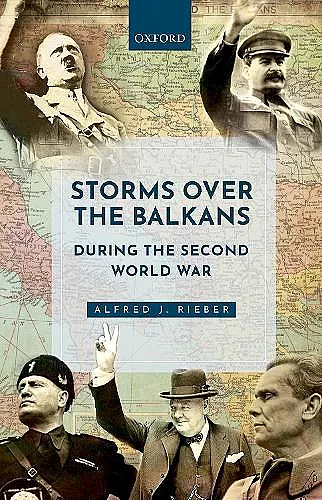Storms over the Balkans during the Second World War
Format:Hardback
Publisher:Oxford University Press
Published:22nd Apr '22
Currently unavailable, and unfortunately no date known when it will be back

In a new interpretation of the history of the Balkans during the Second World War, Alfred J. Rieber explores the tangled political rivalries, cultural clashes, and armed conflicts among the great powers and the indigenous people competing for influence and domination. The study takes an original approach to the region based on the geography, social conditions, and imperial rivalries that spans several centuries, culminating in three wars during the first half of the twentieth century. Against this background, Rieber focuses on leadership - personified by Mussolini, Hitler, Stalin, Churchill, and Tito - as the key to explaining events. For each one the Balkans represented a strategic prize vital for the fulfilment of their ambitious war aims. For the local forces the destabilization of the war offered the opportunity to reorder societies, expel ethnic minorities, and expand national borders. Storms over the Balkans during the Second World War illustrates how the leaders of the external powers were forced to improvise their tactics and compromise their ideologies under the pressure of war and the competing claims of their allies and clients. Neither the Axis nor the Allied camps were uniform blocs, and deep divisions ran through the ranks of the resistance and those collaborating with the occupying powers. These tensions contributed to the failure of all the participants in the struggle to achieve their aims. The complexities of the wartime experiences help to explain the persistence of memories and unfulfilled aspirations that continue to haunt the region. The study is based on extensive research in new sources in seven languages.
Alfred Rieber's insightful, panoramic, and wide-ranging new book on World War II in the Balkans combines the author's impressive expertise on the geopolitics of Eurasia with his unfailing attention to context and detail. * Andrei Culsco, researcher, A. D. Xenopol Institute of History, Romanian Academy, Ialsi, Romania *
Storm Over the Balkans carefully and veraciously analyzes the coming of World War II to the Balkans and the eruptions of violence and fighting in the region that continued into the early Cold War period. Alfred Rieber's newest of many important contributions to the literature on Russia and international affairs is essential reading for anyone who wants to understand the fearsome conflicts that tore apart Yugoslavia in the 1990s and continue to plague the Western Balkans to this day. * Norman Naimark, Stanford University *
In this outstanding and ground-breaking volume, Alfred J. Rieber masterfully disentangles the socio-political, cultural and military complexities of the Balkan conflagration in the first half of the 20th century, focussing on the Second World War and the immediate origins of the Cold War. He brings into sharp relief both the historical continuities and contingencies that informed the shifting strategies and tactics of the key regional protagonists - Mussolini, Hitler, Stalin, Churchill and Tito. The result is a veritable tour de force. * Kevin McDermott, Professor at Sheffield Hallam University *
This is a must read for anyone wanting to make sense of the tragic, complex but little known World War Two experiences of the Balkans. The book shows that personalities matter, but the weight of history and geography as well. It is ultimately a story about the difficulties of the 'small' peoples of Europe to become masters of their own history, rather than objects of Great Power ambitions. Highly erudite, engaging, original -- and so topical given today's situation." * Ulf Brunnbauer, Director of the Leibniz Institute for East and Southeast European Studies, Regensburg, Germany *
A masterful presentation and analysis of the events and personalities that shaped the fate of the Balkans before, during, and immediately after World War Second ... All in all -- a marvellous piece of study that sheds a fresh light on things we thought we knew. * Roumen Daskalov, Professor of modern history, New Bulgarian University *
A particular strength of the book is its all-encompassing perspective. Rather than zoom in on Yugoslavia, as do many authors ostensibly interested in "the Balkans," Rieber helpfully elucidates the roles Greece, Bulgaria, Albania, and, to a lesser degree, Romania played during those fateful years. He demonstrates nuanced and in-depth understanding of the cross-currents, linkages, and mutual influences connecting the individual countries as well as knowledge of the domestic conditions in each of them at the time. * Dimitar Bechev, Russian Review *
Rieber's work is richly researched, with Russian and American archival repositories, as well as additional published primary sources, reflecting the book's focus on political and diplomatic history. * Gregor Kranjc, Brock University, Saint Catharines, Canada *
Alfred Rieber wrote a book that is valuable in different ways, especially in the countries of his "Balkans". We can only wish her as many translations into "local" languages as possible and as many productive discussions as possible. * Drago Roksandić, Hist-Diplo *
The book is written in an academic popular style and is intended for a wide audience and relies on a scrupulous analysis of primary sources... The work of Rieber is especially valuable , in my view, as part of the growing field of research devoted to the origins of the split between Tito and Stalin. * Slavianovedenie 2023 *
Rieber's book is well researched, engaging, and provides an insightful history of the Second World War in the western Balkans that should appeal to generalists and specialists alike. * Mark Biondich, Journal of Modern History *
ISBN: 9780192858030
Dimensions: 240mm x 160mm x 22mm
Weight: 604g
320 pages